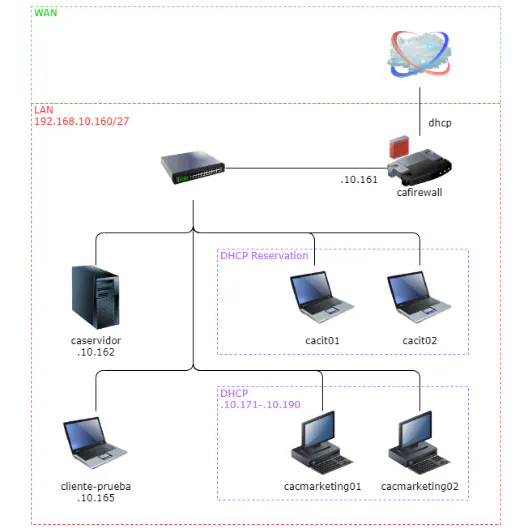Linux networking lab

Objective:
Create a Network lab project with VM configurations, firewall rules, DHCP setup, LVM & RAID storage, automated backups, PXE boot provisioning, and Java application deployment. Link to github
Description:
This lab project, hosted on GitHub, focuses on setting up and configuring multiple virtual machines (VMs) to simulate an enterprise IT infrastructure. It covers network security, firewall rules, server storage management, automated backups, PXE-based OS provisioning, and Java web application deployment.
1. Network Firewall (cafirewall VM)
- Configured as a router with iptables rules enforcing strict security policies.
- Default DROP policy for all chains in the
FILTERtable. - Allows only IT-sector VMs to access it via SSH.
- Enables outbound traffic from LAN to WAN while blocking inbound connections.
- Auto-loads firewall configurations at startup.
2. Server Configuration (caservidor VM)
- Configured with 5 HDDs, utilizing LVM and RAID1 for redundancy.
- Storage validation performed using
lsblk.
3. DHCP Server (isc-dhcp-server)
- Assigns dynamic IPs from 192.168.10.171/27 to 192.168.10.190/27.
- Reserves specific IPs for critical IT systems (
cacit01&cacit02).
4. Automated Local Backups
- Backup script (
backup-data1.sh) executes every 5 minutes. - Logs execution details in a structured format.
- Preserves permissions, symlinks, ownership, and timestamps.
- Uses compression and syncs deletions to maintain an exact backup replica.
- Supports an optional exclusion list for selective file backup.
5. PXE Boot Server on caservidor02
- Configures a PXE boot environment to deploy a Debian image over the network.
- Ideal for provisioning systems dynamically without the need for local installation media.
6. Java Application Deployment on caservidor02
- Deploys the agendasimpleca.war Java web application.
- Provides a real-world use case for hosting business applications within a controlled network.
7. Marketing Workstations
- 4 Debian VMs with a graphical environment.
- DHCP-configured IP addresses.
8. Optional Client VM
- Can be used for direct interaction with
caservidor. - Flexible OS choice for testing purposes.
Key Features & Learning Outcomes:
✅ Hands-on network security & firewall administration
✅ PXE boot setup for automated OS provisioning
✅ LVM & RAID storage management
✅ Automated backups with logging & synchronization
✅ Deploying Java applications on Linux servers
✅ Configuring DHCP and dynamic IP allocation
✅ Virtualized enterprise infrastructure simulation
This project is a valuable reference for system engineers, DevOps professionals, and network administrators, offering a practical approach to real-world infrastructure management.